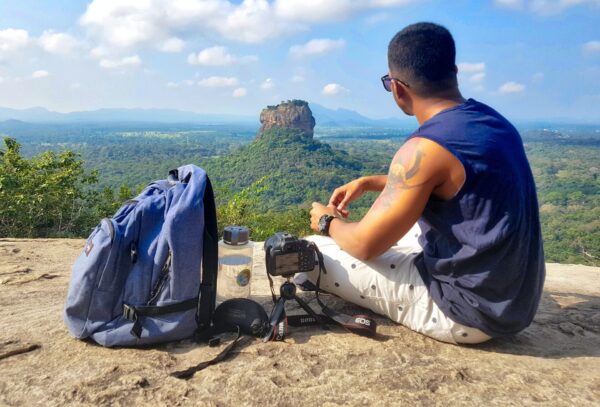If I had a nickel for every time travel assignment I’d been asked one of these questions as a travel nurse recruiter, I could probably buy a nice used 2014 Toyota Corolla Hatchback. (Hey, that’s still a lot of nickels.)
What happens if I hate my travel assignment?
What happens if they cancel my contract?
What happens if they try to make me work in another unit or setting that I’m not qualified to work?
What do I do if the unit is unsafe to work in?
How did you get to be so charming and witty, Charity?
Oops, how did that last one get in there? Heh heh. The point I’m trying to make is that many of you travelers or future travelers are worried about something going wrong on your contracts. Is this normal and completely understandable? Absolutely! You’re going somewhere away from your home, your family and loved ones, and your comfort zone. A little anxiety is to be expected.
Searching for your next gig? Check out our latest travel job openings!
You may be somewhat relieved to know that the “worst case scenario” situations aren’t all that common. However, I do believe in the power of having a plan just in case those situations do occur. The purpose of this blog is to share with you what I believe to be the best advice for handling these sorts of situations, and some suggestions for preventative measures.

What happens if my contract gets cancelled?
Thanks to COVID-19, there was a recent boom in crisis and rapid response contracts. Along with it, stories and accounts of travelers’ contracts getting cancelled ran rampant throughout social media. Crisis contracts are much more volatile by nature, and much more burdensome on the hospitals’ bottom lines, so they are at a much higher risk of getting cancelled. If you are more interested in the crisis assignments, I would be sure that you know this and are okay with those risks should you choose to move forward.
Aside from the crisis positions, travel nursing contracts are generally at a low risk of getting cancelled. You’re being hired for a reason – census is high and there are staffing shortages in nearly every state in the country. In short, you are needed. Personally, as of the time this blog was written, I’ve only had two travelers ever get cancelled from their contracts for low census, and in both situations, we were provided a two week notice from the hospital. Generally speaking, you probably won’t have to worry about it as much as you might think.
Not to brag, but…we’re kind of a big deal. Check out our latest awards and recognition!
However, if for any reason the hospital decides it needs to cut your contract short, work with your recruiter to find another travel assignment ASAP and if you can, get good references from the facility before you leave so that you have those on file and can present them if questioned by future employers. You might also decide it’s a good idea to set yourself up in housing where you only have to pay week-by-week or month-to-month, so that you won’t be out the entire 13 weeks’ worth of housing costs.

What if the assignment is unsafe?
“Unsafe” can mean a lot of different things to different people, but most consistently, it refers to higher-than-normal nurse-to-patient ratios, floating to or working in areas that you aren’t trained in or qualified to work, other concerning processes and procedures, etc.
As a travel nurse, you are likely to run into situations where the conditions are less desirable than usual, especially during the pandemic. It would be beneficial to do some research on your own about the types of unique challenges that nurses are facing in today’s pandemic, just so you have an idea of what you might be dealing with as a traveler. Chances are, you’re dealing with similar challenges in your permanent staff position, but it can be even more stressful when you’re working with a new group of people and in an environment to which you aren’t accustomed. Work with your recruiter on this and ask questions about what they’re hearing from other travelers. Hopefully your recruiter will paint a realistic picture of what to expect, and many agencies also have a clinical liaison on staff to address any clinical-related concerns you might have.
Curious about our benefits? Check them out here!
If you find yourself in an unsafe situation, communicate with your recruiter right away and let them know what you’re experiencing. Depending on the agency and the client, the recruiter may have you document your concerns and/or speak with a clinical liaison. From there, you and your recruiter – as well as the client/facility, as applicable – will hopefully reach a resolution or work on resolving the matter.
Prevention is the best medicine when it comes to situations like this, so use your job interview to gauge the unit and hospital/facility and determine if it would be a good fit for what you’re looking for (or not). (Pro tip: Ask your recruiter for a list of questions to ask during your travel nursing interview to give you some ideas!) Ask your recruiter early on, before you start submitting to positions, what the process is for reporting unsafe conditions and how the recruiter will support you if the worst case occurs.
What if I just don’t like the assignment?
Hey, I’ll be the first to admit that travel nursing isn’t always rainbows and puppies. (If only!) Depending on how long you travel, you’re bound to have a travel assignment that you just don’t particularly care for. It might be a Charge Nurse who rubs you the wrong way, or you don’t like the area, the weather, the hospital, etc. Hopefully you will love most of your assignments, and you’ll enjoy traveling overall, but it’s not realistic to expect that you’ll love EVERY assignment.

The cool thing about travel nursing is that you’re usually never stuck in one place for longer than three months at a time. If you aren’t crazy about it, you won’t be there long and you can move on to your next adventure with a better understanding of what’s important to you and what you’d rather not deal with again in the future. Even when things aren’t wonderful, you can almost always find something good about the assignment. Perhaps you are learning new skills, or you are making a new friend or two, or you’ve discovered a coffee shop that is like a home away from home. Focus on the things that you enjoy and the time will pass before you know it.
If after all of it, you decide that travel nursing just isn’t your cup of tea, then there will almost always be a hospital or facility that will take you in as a staff nurse with open arms. You can be proud of yourself knowing that you gave it your best shot and you never have to regret NOT taking the leap.
Meet our Travelers of the Month here! They’re the bee’s knees AND the cat’s meow. (In other words, they’re awesome.)
The common denominator in these scenarios is finding a great recruiter. Issues will happen and curve-balls will be thrown, but knowing that you’ve got a recruiter who has your back and will advocate for you when it’s needed will give you peace of mind and a much more enjoyable travel assignment. Be very particular when searching for the right agency and recruiter. Don’t be afraid to ask them questions (Psst… Here’s a blog post I wrote with some suggestions of what to ask your recruiters!) and make sure that you feel like you can count on them when they’re needed most.
Don’t let your fears of something going wrong impact your decision to travel! Educate yourself, do plenty of research, and find an amazing recruiter or two who can help you navigate through the sticky situations. The benefits and positives of a travel assignment will likely outweigh any trade-offs in the end. Godspeed!
Speaking of great recruiters – how about we set you up with one?
Fill out this quick application and one of our Axis Rock Star Recruiters will contact you very soon!
"*" indicates required fields
- Charity Recommends Glacier National Park - June 21, 2024
- Should I Extend My Travel Nurse Assignment? - November 23, 2022
- Axis Recommends – New River Gorge National Park - September 2, 2022

